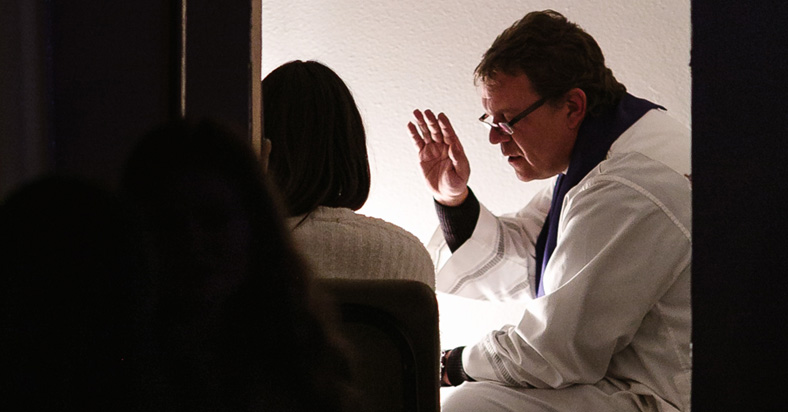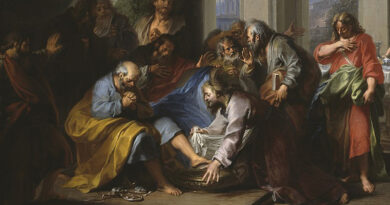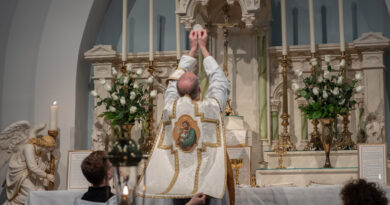The Divine Authority: Catholic Priests’ Power to Forgive Sins as Rooted in the Bible
In the realm of Christianity, the authority of Catholic priests to forgive sins stands as a distinctive aspect of the faith. This spiritual power, often referred to as the sacrament of reconciliation or confession, is deeply rooted in the teachings of the Bible and has been a subject of contemplation and reverence for centuries.
The foundational basis for the Catholic Church’s doctrine of priestly forgiveness of sins is found in the New Testament, particularly in the words of Jesus Christ himself. One pivotal passage that underpins this authority can be found in the Gospel of John 20:21-23, where Jesus appears to his disciples after his resurrection. He imparts upon them a profound gift, saying:
“Peace be with you. As the Father has sent me, even so I send you.” And when he had said this, he breathed on them and said to them, “Receive the Holy Spirit. If you forgive the sins of any, they are forgiven them; if you withhold forgiveness from any, it is withheld.”
This passage is of paramount importance to understanding the Catholic perspective on priests’ authority to forgive sins. The act of breathing on the disciples and the bestowal of the Holy Spirit mirrors the event of Pentecost, when the Holy Spirit descended upon the apostles, empowering them for their ministry. It signifies a transfer of Christ’s divine authority to forgive sins to his chosen apostles, who would later become the first bishops and leaders of the Christian Church.
Through these words, Jesus grants his apostles the power to absolve sins, not as mere human intercessors, but as conduits of his divine mercy. The passage makes a clear distinction between the authority to forgive and the authority to withhold forgiveness, emphasizing the role of the apostles as mediators between God and humanity.
This understanding aligns with the Catholic belief in the apostolic succession, wherein the authority granted to the original apostles is passed down through an unbroken line of bishops and priests. Through this succession, Catholic priests are believed to inherit the divine power to forgive sins, ensuring the continuation of Christ’s redemptive mission on Earth.
The sacrament of reconciliation, as practiced in the Catholic Church, is a tangible manifestation of this authority. Penitents, seeking to mend their relationship with God and the community, confess their sins to a priest in the privacy of the confessional. The priest, acting in persona Christi (in the person of Christ), exercises the divine authority conferred by Christ and offers absolution, granting God’s mercy and forgiveness to the repentant individual.
While this understanding of priestly authority to forgive sins may differ from interpretations in other Christian traditions, the Catholic Church’s position is firmly rooted in its interpretation of scripture and apostolic tradition. The Gospel of John 20:21-23 serves as a cornerstone for this belief, reflecting a continuity between the earthly ministry of Christ and the ongoing spiritual journey of believers.
In conclusion, the Catholic priests’ power to forgive sins is an integral part of the faith’s spiritual landscape, anchored in the teachings of the Bible. The Gospel of John provides a foundation for the doctrine of sacramental reconciliation, connecting the authority of the apostles to the ongoing ministry of the Church. As believers participate in this sacrament, they partake in a profound expression of God’s mercy, guided by the words and actions of Christ himself.
Other Biblical Sources
Leviticus 4:26 – “and the priest shall make atonement for him as concerning his sin, and he shall be forgiven.”
This passage from the Old Testament shows us God’s clear intention to use his priests for the forgiveness of sins.
John 20: 21-23 – “Jesus said to them again, ‘Peace be with you. As the Father has sent me, even so I send you.’ And when he had said this, he breathed on them, and said to them, ‘Receive the Holy Spirit. If you forgive the sins of any, they are forgiven; if you retain the sins of any, they are retained.’“
Jesus was sent by his Father not just to preach or perform miracles, but he was also sent to atone for humanity that their sins may be forgiven. On the same reason he sends his priests to the world, their job is to do the same.
2 Cor 2:10 – “Any one whom you forgive, I also forgive. What I have forgiven, if I have forgiven anything, has been for your sake in the presence of Christ,“
The apostle Paul, exercising his priestly and apostolic authority, writes to the troubled Corinthians, instructing them to forgive certain persons of fault. But note that he only says he forgives those who are forgiven. In that statement, we can also conclude that those who are not forgiven, are also not forgiven by Paul. This kind of forgiveness is not just for forgiveness sake, it’s not just to create peace within the community, but rather it’s also Paul’s authoritative appeal before Christ for the forgiven sinner.




